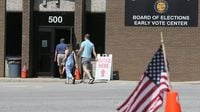As Ohioans head to the polls for the primary election on May 6, 2025, they face a pivotal decision on statewide Issue 2, which proposes a significant boost to the state's infrastructure funding. This year, voters will determine whether to authorize $2.5 billion in general obligation bonds aimed at enhancing public infrastructure projects across the state.
Polling places will open at 6:30 a.m. and close at 7:30 p.m., giving residents a full day to cast their votes. Election officials are urging voters to check their registration status and familiarize themselves with the ballot before heading out to vote. For those who have requested absentee ballots, these must be postmarked by May 5 and received by the elections board no later than four days after the election.
Issue 2, a constitutional amendment, aims to renew the state's ability to issue bonds for the State Capital Improvement Program (SCIP) and the Local Transportation Improvement Program (LTIP). If approved, the state would increase its annual cap on issuing general obligation bonds from $200 million to $250 million, allowing for a total of $2.5 billion over the next decade. This funding is earmarked specifically for essential infrastructure projects like roads, bridges, water supply systems, and wastewater treatment facilities. Importantly, this bond issue is separate from the controversial $600 million request for a new Cleveland Browns stadium, ensuring that funds are dedicated solely to public works.
According to the Ohio Secretary of State Frank LaRose, Issue 2 has garnered bipartisan support from various stakeholders, including the Ohio Chamber of Commerce and trade unions. The outcome of this vote could significantly impact local governments' ability to maintain and improve infrastructure, which has been a growing concern as many communities face aging facilities and increased demands for services.
In addition to Issue 2, voters will also see a variety of local races and levies on their ballots. For instance, in Columbus, candidates for City Council District 7 include Kate Curry-Da-Souza, Tiara Ross, and Jesse Vogel. The Columbus Board of Education is also holding elections, with candidates such as Liz Caslin-Turner and Teresa Hannah vying for three available positions.
Several townships are proposing fire and police levies to fund essential services. For instance, Brown Township is asking voters to approve a 5.2 mill permanent fire levy, which would cost property owners approximately $182 annually for each $100,000 of appraised property value. Similarly, Blendon Township is seeking a 4.48 mill levy to support its police department, which would cost homeowners about $157 per $100,000 of appraised value if approved.
In Summit County, the Akron-Summit County Public Library system is also on the ballot, with Issue 18 proposing a $160 million bond to enhance library facilities. This would result in a property tax increase of $35 annually for each $100,000 of appraised value.
As voters prepare to make their choices, they are reminded of the importance of bringing valid identification to the polls. Acceptable forms of ID include an Ohio driver’s license, state ID card, U.S. passport, military ID, and others. Voters without proper identification can still cast a provisional ballot, but they must return to the elections office with valid ID within four days for their vote to be counted.
Election Day is expected to see a high turnout, particularly due to the critical nature of the issues at stake. With many Ohioans concerned about infrastructure and local services, the results of this election could shape the future of community development and public safety for years to come.
For those unable to vote in person, absentee voting is available, and voters can check their registration status and polling places through the Ohio Secretary of State's website. This election marks a significant opportunity for residents to voice their opinions on critical issues affecting their communities.
As the clock ticks down to Election Day, Ohio voters are encouraged to make their voices heard and participate in this vital democratic process. With the stakes high and numerous local issues on the table, every vote will count.



